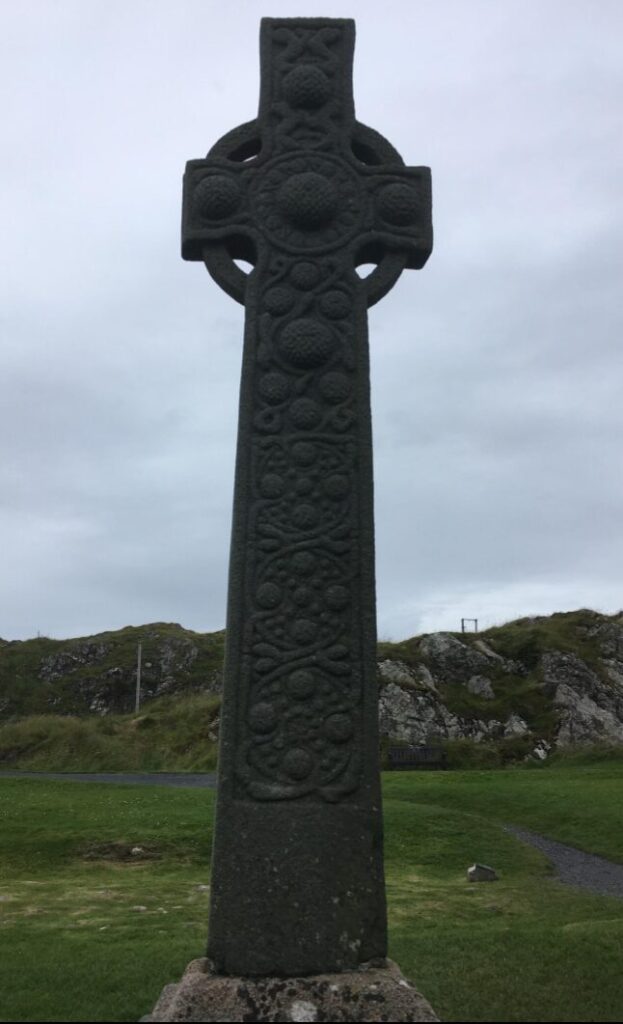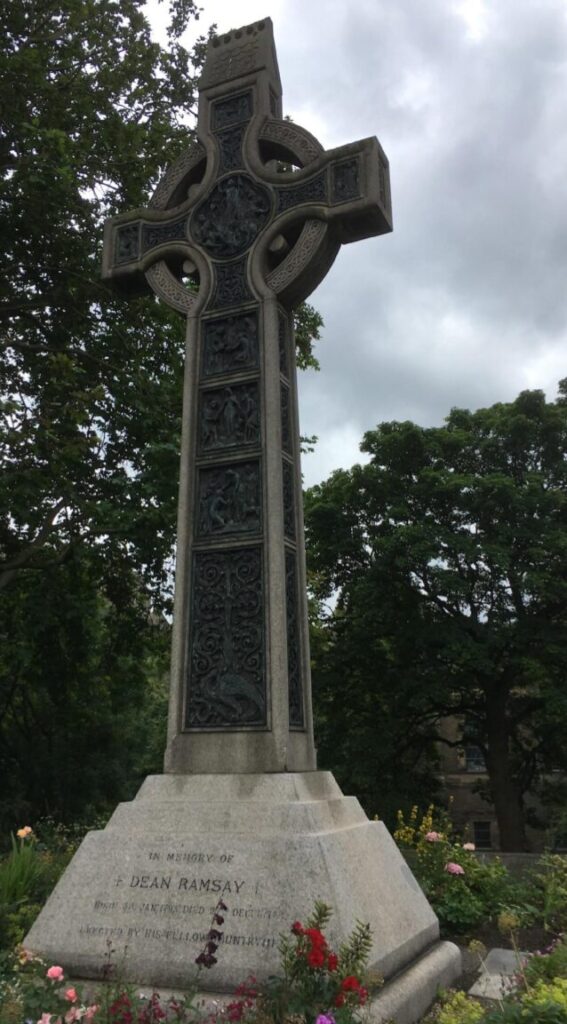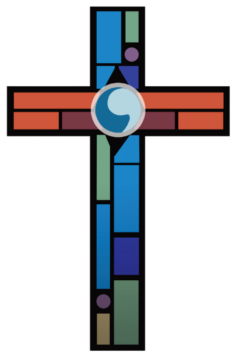Today is a very unique day because it’s St. Patrick’s Day and Sunday.

As I was putting this sermon together, I also heard a short lecture by a very famous Celtic theologian named John Philip Newell. He was talking specifically about the Celtic cross. They are different than our cross. Celtic spirituality is a bit different than Western spirituality.
The Celtic spirituality dates back to the very beginning days of Christianity. The cross that I’m showing on the right side is from the Isle of Iona. Iona is one of the birthplaces of Christianity in the UK and parts of Europe. So, that cross has been standing there since at least a 1000 A.D, if not before.
Here’s the difference between our cross and the Celtic cross.
The most obvious difference that you will be able to see is the cross, which represents what what Christ died on. We’re not actually sure if that crossbar’s there. It may have been a single stake that Jesus was hung on, but we have the cross. Then, on the Celtic cross there is the circle or the orb that goes right around that intersection. The circle or the orb, stands for God being known in the universe.

The cross itself is God being known through Christ. They look at the cross in three ways. They believe that when you look at the cross, you see the love of God, and it connects with the divine within us.
The one side of a Celtic cross has images from creation. It’s full of orbs and it looks like snakes that intermingle and it’s because it’s showing you the universe. They believe that God is found and known through the universe, the natural world.
But on the other side, which is better seen on the one on the left, there are Biblical stories. So God is known through nature, the natural world. God is known through what they call the small book. We don’t usually think of the Bible as a small book, but when you compare it to the universe, it is a small book.
Then they look at how we are affected when we encounter the cross. In Western Christianity, it was in the words to “Lord, I Lift your Name on High.” We sang about the debt you paid, “You came to heaven to earth to show the way, from the earth to the cross, my debt to pay”.
Celtic spirituality doesn’t believe that Jesus went to the cross for us to take away our sin. He went to the cross because he challenged the rulers of the time. He challenged the religious leaders. The high priests wanted to get rid of him because he was saying things and doing things that they could not do. He raised somebody from the dead. Caiaphas and the high priests never raised anybody from the dead. He was doing things that were challenging their authority, and he was challenging the Roman authority because he was suggesting that the people should live in a different way. Jesus was very much about getting rid of the oppression on the people.
Our cross and this idea of it is substitutionary atonement. That means that Christ died in our place.
There’s a hymn that we sing about seeing my sins hanging on the cross or nailed to the cross. It’s in “It Is Well With My Soul”. I don’t agree with it, it’s not my theology. So I don’t sing it anymore, because I don’t believe that my sins hung on that cross.
I do believe I’m forgiven through Jesus. I believe that Jesus went to the cross because Jesus loved humanity more than life itself. Do you see that distinction? This theology works so much better for me. It feels right in my body.
Maybe that’s because I do connect to God in nature a lot.
My experience in Iona was very eye opening because I do have an Irish-Scotch background. When I was in Iona, I was at home. I felt connected to the earth and everything. Then we did some research and the Irish surname that I have, it’s Nordic.
That means I was part of the Vikings. I’ve got Viking heritage. So, although I may have had linkage somehow to those first Celtic spirituality people on Iona, in the 800s, the Vikings conquered Iona and burned everything to the ground. Now it was rebuilt, and Roman Christianity came in. But the point that our cross and substitutionary atonement both tell you that you are wrong, that you are unworthy of God’s love, which aligns with the empire.
That’s what the empire wants you to think. The Empire wants you to think that you are not good enough. In the 4th century when the Empire and Christianity went together, then Christianity claimed all the same things that the Empire did. They wanted to control people. They knew that they could control people with shame and guilt, and have done it for a long time.
In Celtic spirituality, when they look at the cross, they don’t see guilt and shame. They don’t feel that their sins were forgiven on that cross. What they feel is love. For them, the cross is revelatory. It is almost like an icon, and it helps them experience God. Because those who love God, will do God’s will, which is to love others. Which is to lay down one’s life for one’s friends. Which is how it ties into the scripture. That was part of the scripture for today.
I had the privilege of going to see this movie yesterday, and I’m going to recommend it to you.
It’s called One Life.

It does star Anthony Hopkins as Sir Nicholas Winton. I’d never heard of him before, but he’s a very famous Brit, who in 1938, he was a broker, and he had connections who went to Prague.
I think they were doing banking in Prague, and they got involved with the Jewish refugees in Prague. He decided that even though he was an ordinary man, he could make a difference. He could lay down his life. This is my words. This isn’t in the movie. He would tell you he’s an ordinary man and he could save at least one life.
But what he and his three other companions did was they got 669 children out of Prague and to England. That meant getting them the 50 pounds it cost to get a visa. He had to find foster families in England who were willing to take all these children, and he had to have all the information on the children.
It is a powerful movie. It is a wonderful story. It is based on the true story. He was knighted by the queen. So he is Sir Anthony and he has passed. He lived to be 106. But he always had guilt that he could have gotten more children out.
When we think about our lives, if we think that we just have one ordinary life.



